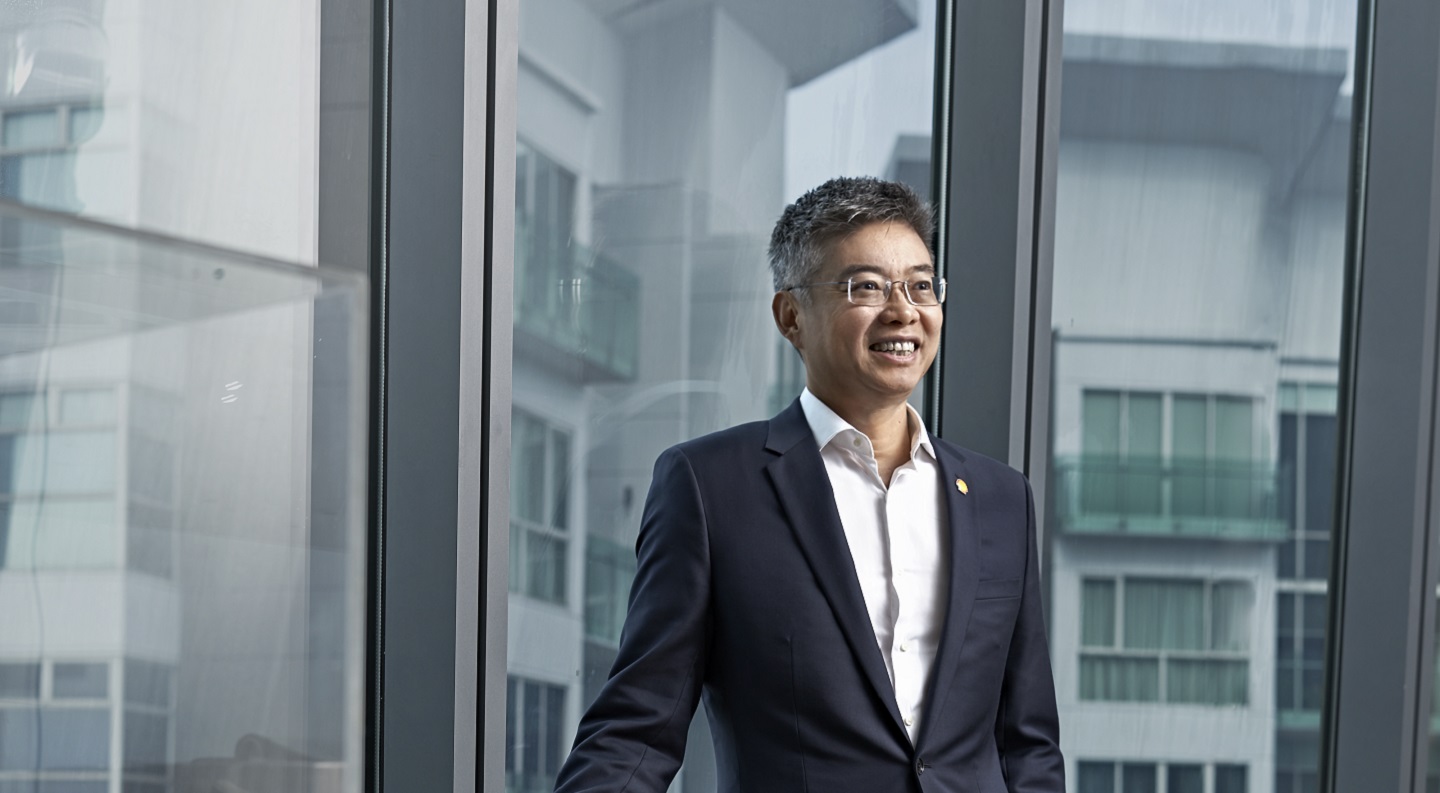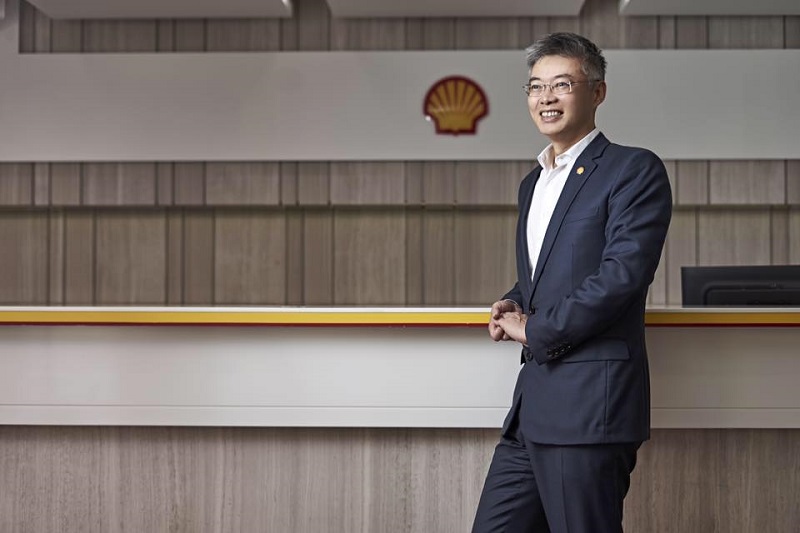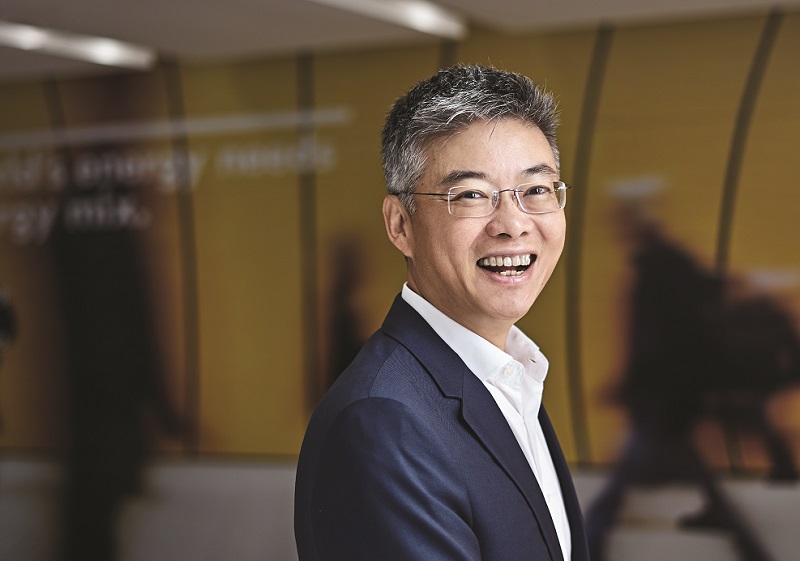
(Photography by Edmund Lee)
For some reason, remaining in the employ of the same company for more than 20 years is normal in the oil and gas industry, though it can be rare in other industries. Datuk Iain Lo, chairman of Shell Malaysia, has clocked up nearly three decades, having been with the Dutch oil company almost since the start of his career. What has kept him at Shell is one of the first questions Lo addresses, his sense of pride setting the tone for the rest of our interview — it is simply a great place to be, he says.
“When I started at Shell, I thought ‘Ok, let me give it five years and then do a review’. I did reviews every five years, and every time it was a no-brainer for me that I should stay,” he says. “I started in offshore construction, then I was moved to field development and later I was supporting production-sharing contract negotiations — there was always something new to do and my career was always progressing. I was promoted every two years, the pay was good and I was learning a lot — I kept giving the company five more years, and now it’s been 26.”
A foodie with a passion for wine, Lo is as well known among Kuala Lumpur’s corporate captains for his passionate pursuits outside of the job as he is for the incredible work he has done at Shell Malaysia. Married to South Korean restaurateur Datin Sainy Chun, Lo is often to be seen at some of the capital’s most critically acclaimed eateries, savouring a glass of wine (his favourites are white Burgundies and reds from Bordeaux) in the company of good friends — although, even by his own admission, his job “does not really give me much time off”.
Throughout our hour-long conversation, I am taken by Lo’s humility, kindness and sense of respect — there is a tacit understanding that all that we do today is to benefit a younger generation whom we may never even meet. Perhaps, being in oil and gas provides this perspective, particularly in the setting of a company like Shell that prides itself on caring for its resources — human and environmental.
Not that Lo knew this about Shell when he signed up for the job. The Kuching-born, UK-educated, US-trained civil engineer was just looking for something more exciting than what his father’s construction and architectural firm could offer. Returning from a stint as an earthquake engineer in California, Lo decided that being a partner in a family-run firm was not in tune with his bigger ambitions. “At the time, there was this company in Miri that was hiring engineers and promising a lot of exciting careers. I thought, ‘Well I know nothing about oil and gas, but hey need to build platforms offshore and I know something about building structures, so let’s give it a go’,” he recalls.

It was a decision that would alter the path of his career — and his life — tremendously. Shell would take him all over the world and provide him with untold chances to grow and learn, both professionally and personally. He picked up his passion for wine through Shell, for example, and also his love for golf. Now, Lo is back home to do the same for Malaysia. “Shell Malaysia has been extremely good to me,” he smiles. “Returning home is a way to give back to the place that has given me so many experiences and opportunities.”
Made in Malaysia
Where Menara Shell is located now, in the sprawling KL Sentral complex, was once a Shell petrol station patronised by the writer’s grandfather. Years later, he would visit the station to spoil his grandchildren with otherwise banned treats acquired from its convenience store while exchanging stories with old-timers from the neighbourhood who would come by, often for the same reason. He had passed away by the time the station was finally torn down, but as if by kismet, a Shell station has opened up around the corner from where I live today — albeit in a completely different suburb.
After 126 years of business in Malaysia, Shell features heavily in many a Malaysian’s life story, like mine, and in varying degrees. “The Straits Settlements of Singapore, Malacca and Penang is where Shell actually grew up as a company — the Dutch East Indies is where Shell Trading & Transport grew, plying the trade from Baku through to this part of the world,” Lo shares.
Shell Malaysia has been extremely good to me... returning home is a way to give back to the place that has given me so many experiences and opportunities.
In Sabah and Sarawak, Shell is credited with developing many of the coastal towns that are today central to the oil industry. Miri, for example, was essentially created in 1910, when Shell first discovered oil there. By 1929, Miri had become so developed, thanks to the oil money that flowed through it, that it became the administrative centre of the northern region of Sarawak.
“Shell basically founded the town of Miri. When we got there, we had to build everything from power generators to hospitals and schools. When I first joined Shell, I spoke to some of the old-timers in Miri and they told me about how when they wanted to get electricity back in the day they would go to Shell. Not the government, but Shell,” he says.
This role of Shell’s has rubbed off on Lo, who has been inspired to give back to his home country, which is also the nation that has given the company so much. Under his watch, Shell and Petroliam Nasional Bhd have come together to establish the Piasau Nature Reserve in Miri, an urban nature reserve that promotes natural, ecological, recreational, scientific and educational values. It is intended to offset the environmentally destructive disadvantages of urban development.
Historically, the Piasau Camp was a rustic area that served as living quarters for Shell employees, featuring unconventionally structured buildings, designed to be in tune with nature — single or double-storey detached staff houses with no fencing and shaded by tall casuarina trees. As Miri started to grow — it acquired city status in 2005 — residents became wary of over-development, and rightly so as the forest reserve, which is by the sea, is a prime piece of property that would, for some, be viewed as ideal for a condominium project of some kind.
This might have happened had Shell not intervened and petitioned the state government to gazette the land as a nature reserve. “Oil and gas is a depletion industry, so we know one day it will run out. I wanted to leave behind in Miri something that would last forever, as grandiose as that sounds,” Lo says. “I asked the staff to come up with some ideas of what we could do with the land. Someone — I don’t know who — pointed out that a lot of hornbills were breeding there, so it was suggested we turn it into a nature reserve. And that is what we have done. It is under construction now, and I think it will be a fantastic legacy for the oil and gas industry to leave to Miri — an urban nature reserve so people have access to nature and the beach.”
Another nation-building project Lo has personally spearheaded is the Shell LiveWIRE programme, a global corporate social responsibility (CSR) initiative that unleashes the entrepreneurial potential of deserving young people. Although Lo cannot take credit for the idea itself, he does pride himself on bringing the programme to Malaysia — specifically, to Kota Kinabalu and Mantanani Island.
“The Shell Group’s LiveWIRE has been going on in a number of countries since the 1980s. For some reason, we had not brought it to Malaysia and I thought we should try it out — particularly in Sabah and Sarawak. Not because it is where I am from, but because we produce a lot of oil in Sabah and Sarawak and it is time for us to give back. The way the industry has shaped up is that there has been a lot of production in Sabah and Sarawak, but the share of the stake in the services sector isn’t that great, with more of it going on in Peninsular Malaysia.”
Rolled out last year to mark the company’s 125th anniversary in the country, Shell LiveWIRE Malaysia offers aspiring entrepreneurs aged 18 to 35 a variety of courses to develop their business skills and ideas. It is about giving budding entrepreneurs some helpful guidelines on how to develop a strong business idea, how to turn that idea into an actionable business plan and how to actually start a business and make it work.
“My agenda is that our people get to be the coaches and mentors for this programme so it exposes them to entrepreneurship, albeit on a very small scale, which makes them think about business in a more holistic way. In a big company, the roles can get functionalised. I attended one of the courses and I love this nugget that I heard — in a small business, the CEO means chief everything officer because you do everything. In a big company, the roles are specialised and very few people see processes end-to-end. In a small business, you have to help them think end-to-end and not just in terms of your own specialities.”
LiveWIRE has also helped Lo identify the same ambition in others that he once had himself. “When people volunteer for things like this, you can tell these people have ambition and are willing take risks and put in the extra time. All the people we hire are smart, but the ones who make a difference and who really make it are the ones with the additional drive and ambition — and you can see it from who volunteers for this. So, there is payback to the community and a platform for us to do some people development too,” he says.

In his efforts to streamline Shell Malaysia’s CSR programmes to create more impact, he has also had a little fun — the company’s support of MotoGP racing has allowed Lo to indulge his love for grand prix motorcycle racing. Last year, the company committed to a four-year title sponsorship — the races, which were held from Oct 27 to 29, are officially known as the Shell Malaysia MotoGP.
“Malaysians love MotoGP! On the track, you can see Valentino Rossi’s fans on one side, Marc Márquez’s on the other — people really have fun and the racing is incredible,” Lo exclaims. “We are trying to see if we can do some developmental work — there are some local riders, but not many. My long-range plan is get [young] people off the streets and on the track to do some real racing while flying the flag for the country. What you need in order to build interest and talent is have races at state, national and regional levels so people have a chance to compete and nurture skills — you cannot jump from nothing to MotoGP, it’s too big a leap. I want to create a niche for Malaysia that puts it on the global stage.”
Powering — and empowering — the nation
According to Lo, the local oil and gas industry is coming into a new phase with basins getting more mature and located in smaller and deeper waters with more contaminants and at higher temperatures, which means fuel is becoming more expensive to produce. Shell’s advantage as one of the world’s largest oil and gas producers is that it is able to plough its profits back into exploration to create more runway for the future.
While its midstream business is doing well, Shell remains the market leader in the downstream sector, with new product launches that keep it at the top of the mind with consumers. In the downstream segment, Lo’s aim is to get more into the gas advocacy space to help the nation meet its COP 21 commitments.
Shell has already begun investing in a renewables business — it may be some way in the future but transitions take time and mindsets do not change overnight. Lo hopes to be in a position to help the government with a blueprint for the transition from being an oil-reliant economy to one that runs on other sustainable energy sources. Gas, Lo says, is the ideal transition fuel and the perfect complement to whatever renewables we would one day consider — solar power, for example, cannot be generated at night and wind power is entirely weather dependant.
“From a corporate perspective, the energy transition is the important one that we are thinking about,” Lo adds. “But, of course, [we are] not [being] completely altruistic — what happens to Shell in the future once the oil and gas runs out, and what kind of business are we going to have? We are going to need energy for sure — the world’s population is going to double by 2050 and the need for energy will also double. We want to be part of shaping the future energy landscape so we can remain in business.”
But the most important resource, Lo believes, is human and it is a personal aim of his to build future leaders for the country who can power it into the future. “When I was at the Asia Oil and Gas Conference, the number of former Shell staff I saw in senior positions at other companies was amazing! So that, for me, is a powerful legacy — we hire good people, we train them well, we give them good exposure and they become a valuable resource to the country,” he says.
Shell may be in the business of oil and gas, but it is clear that its people is what fuels the company as it continues to grow. Lo himself is a great example of the kind of quality employee that the company produces — a leader with heart, a passionate advocate for the country and a man of great sensitivity who remains faithful to the land that has served him so well.
---
This cover story appeared in the Nov 6, 2017 issue of The Edge Malaysia. Save by subscribing to us for your print and/or digital copy.


